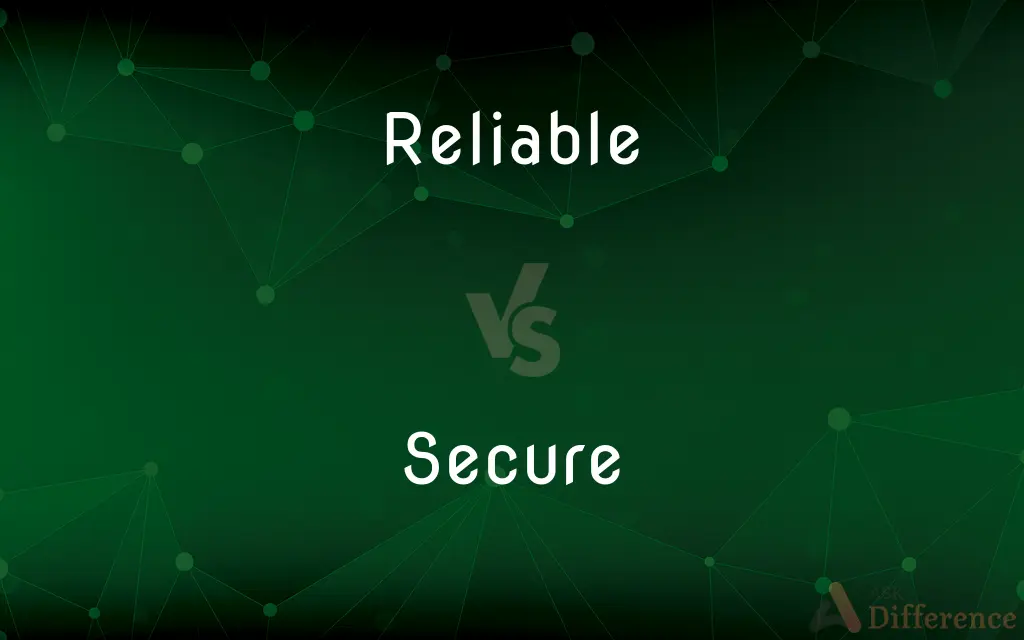Reliable vs. Secure — What's the Difference?
Edited by Tayyaba Rehman — By Maham Liaqat — Updated on March 27, 2024
Reliable means consistently performing as expected, while secure refers to being protected against threats or unauthorized access.

Difference Between Reliable and Secure
Table of Contents
ADVERTISEMENT
Key Differences
Reliability and security are both crucial qualities in various contexts, including technology, communication, and transportation, but they address different concerns. Reliability focuses on the ability of a system, process, or piece of equipment to perform its intended function consistently over time, under specified conditions. This implies a measure of predictability and dependability in operation, with minimal failures or errors. Secure, on the other hand, emphasizes protection and safety from external threats, breaches, unauthorized access, or damage. Security involves implementing measures to guard against espionage, theft, or assault, ensuring that information, people, or assets are kept safe.
In the context of technology, a reliable system operates without frequent breakdowns or failures, providing consistent service or performance as expected by users. For example, a reliable internet service offers consistent connectivity without frequent disruptions. Meanwhile, a secure system in the same context protects against cyber threats, unauthorized data access, and ensures the confidentiality, integrity, and availability of information. Thus, while a service can be reliable in terms of uptime and performance, it must also be secure to protect users and data from cyber-attacks and breaches.
The interplay between reliability and security is especially evident in critical infrastructure systems, such as power grids, transportation networks, and financial services. For these systems, being reliable means operating continuously without failure, as interruptions could lead to significant consequences. Being secure for these systems means protecting against sabotage, terrorism, or cyber-attacks that could exploit vulnerabilities to cause harm or disrupt services.
Achieving high levels of reliability and security often requires different strategies and considerations. Reliability can be enhanced through redundancy, quality control, and robust design, ensuring that systems continue to operate effectively even under stress or failure of individual components. Security, however, requires the implementation of protective measures such as encryption, access controls, and regular security assessments to defend against evolving threats and vulnerabilities.
Understanding the difference between being reliable and secure is key to evaluating and improving systems and services across various sectors. While reliability ensures that systems perform their intended functions consistently, security protects those systems from external threats and breaches. Both qualities are essential, and in many cases, improvements in one area can positively impact the other, leading to systems that are both dependable and protected against threats.
ADVERTISEMENT
Comparison Chart
Focus
Consistent performance and availability
Protection against threats and unauthorized access
Key Concern
Functionality and dependability
Confidentiality, integrity, and availability of information or assets
Strategies
Redundancy, quality control, robust design
Encryption, access controls, security assessments
Contexts
Technology, transportation, infrastructure
Cybersecurity, data protection, personal safety
Measures
Performance metrics, uptime, failure rates
Security protocols, encryption standards, access restrictions
Compare with Definitions
Reliable
Pertaining to consistent performance and availability.
The software's reliable performance has made it a favorite among users.
Secure
Involves protection from threats and unauthorized access.
Secure messaging apps encrypt conversations to protect against eavesdropping.
Reliable
Emphasizes minimal failures or errors in operation.
Reliable transportation systems reduce delays and improve user satisfaction.
Secure
Achieved through encryption, access controls, and vigilance.
Using strong encryption, the data remained secure even if intercepted.
Reliable
Measured by uptime, performance metrics, and failure rates.
The company boasts a 99.9% uptime, highlighting its system's reliability.
Secure
Focuses on safeguarding information, assets, and individuals.
The bank implemented new security measures to protect customer data.
Reliable
Achieved through redundancy and robust design.
By incorporating redundancy, the network became more reliable against failures.
Secure
Essential in defending against cyber-attacks and breaches.
Regular security assessments help organizations stay ahead of cyber threats.
Reliable
Important in systems where continuous operation is critical.
Hospitals require reliable power supplies to ensure patient safety.
Secure
Measures include security protocols and standards compliance.
The software's adherence to security standards assures users of its safety.
Reliable
Capable of being relied on; dependable
A reliable assistant.
A reliable car.
Secure
Free from danger or attack
A secure fortress.
Reliable
Yielding the same or compatible results in different clinical experiments or statistical trials.
Secure
Free from risk of loss; safe
Her papers were secure in the vault.
Reliable
Suitable or fit to be relied on; worthy of dependence, reliance or trust; dependable, trustworthy
Secure
Free from the risk of being intercepted or listened to by unauthorized persons
Only one telephone line in the embassy was secure.
Reliable
Such that either a sent packet will reach its destination, even if it requires retransmission, or the sender will be told that it didn't
Secure
Free from fear, anxiety, or doubt
Felt secure in his old job.
Reliable
Something or someone reliable or dependable
The old reliables
Secure
Not likely to fail or give way; stable
A secure stepladder.
Reliable
Suitable or fit to be relied on; worthy of dependance or reliance; trustworthy.
The best means, and most reliable pledge, of a higher object.
According to General Livingston's humorous account, his own village of Elizabethtown was not much more reliable, being peopled in those agitated times by "unknown, unrecommended strangers, guilty-looking Tories, and very knavish Whigs."
Secure
Firmly fastened
A secure lock.
Reliable
Worthy of reliance or trust;
A reliable source of information
A dependable worker
Secure
Reliable; dependable
Secure investments.
Reliable
Conforming to fact and therefore worthy of belief;
An authentic account by an eyewitness
Reliable information
Secure
Assured; certain
With three goals in the first period they had a secure victory, but somehow they lost.
Reliable
Worthy of being depended on;
A dependable worker
An honest working stiff
A reliable source of information
He was true to his word
I would be true for there are those who trust me
Secure
(Archaic) Careless or overconfident.
Secure
To guard from danger or risk of loss
The troops secured the area before the civilians were allowed to return.
Secure
To make firm or tight; fasten.
Secure
To make certain; ensure
The speaker could not secure the goodwill of the audience.
Secure
To guarantee payment of (a loan, for example).
Secure
To guarantee payment to (a creditor).
Secure
To get possession of; acquire
Secured a job.
Secure
To capture or confine
They secured the suspect in the squad car.
Secure
To bring about; effect
Secured release of the hostages.
Secure
To protect or ensure the privacy or secrecy of (a telephone line, for example).
Secure
Free from attack or danger; protected.
Secure
Free from the danger of theft; safe.
Secure
Free from the risk of eavesdropping, interception or discovery; secret.
Secure
Free from anxiety or doubt; unafraid.
Secure
Firm and not likely to fail; stable.
Secure
Free from the risk of financial loss; reliable.
Secure
Confident in opinion; not entertaining, or not having reason to entertain, doubt; certain; sure; commonly used with of.
Secure of a welcome
Secure
(obsolete) Overconfident; incautious; careless.
Secure
Certain to be achieved or gained; assured.
Just when victory seemed secure, they let it slip from their grasp.
Secure
To make safe; to relieve from apprehensions of, or exposure to, danger; to guard; to protect.
Secure
To put beyond hazard of losing or of not receiving; to make certain; to assure; frequently with against or from, or formerly with of.
To secure a creditor against loss; to secure a debt by a mortgage
Secure
To make fast; to close or confine effectually; to render incapable of getting loose or escaping.
To secure a prisoner; to secure a door, or the hatches of a ship
Secure
To get possession of; to make oneself secure of; to acquire certainly.
To secure an estate
Secure
To plight or pledge.
Secure
Free from fear, care, or anxiety; easy in mind; not feeling suspicion or distrust; confident.
But thou, secure of soul, unbent with woes.
Secure
Overconfident; incautious; careless; - in a bad sense.
Secure
Confident in opinion; not entertaining, or not having reason to entertain, doubt; certain; sure; - commonly with of; as, secure of a welcome.
Confidence then bore thee on, secureEither to meet no danger, or to findMatter of glorious trial.
Secure
Not exposed to danger; safe; - applied to persons and things, and followed by against or from.
Secure
To make safe; to relieve from apprehensions of, or exposure to, danger; to guard; to protect.
I spread a cloud before the victor's sight,Sustained the vanquished, and secured his flight.
Secure
To put beyond hazard of losing or of not receiving; to make certain; to assure; to insure; - frequently with against or from, rarely with of; as, to secure a creditor against loss; to secure a debt by a mortgage.
It secures its possessor of eternal happiness.
Secure
To make fast; to close or confine effectually; to render incapable of getting loose or escaping; as, to secure a prisoner; to secure a door, or the hatches of a ship.
Secure
To get possession of; to make one's self secure of; to acquire certainly; as, to secure an estate.
Secure
Get by special effort;
He procured extra cigarettes even though they were rationed
Secure
Cause to be firmly attached;
Fasten the lock onto the door
She fixed her gaze on the man
Secure
Assure payment of
Secure
Make certain of;
This nest egg will ensure a nice retirement for us
Preparation will guarantee success!
Secure
Fill or close tightly with or as if with a plug;
Plug the hole
Stop up the leak
Secure
Furnish with battens;
Batten ships
Secure
Free from fear or doubt; easy in mind;
Secure himself, he went out of his way to help others
Secure
Free from danger or risk;
Secure from harm
His fortune was secure
Made a secure place for himself in his field
Secure
Kept safe or defended from danger or injury or loss;
The most protected spot I could find
Secure
Not likely to fail or give way;
The lock was secure
A secure foundation
A secure hold on her wrist
Secure
Able to withstand attack;
An impregnable fortress
Fortifications that made the frontier inviolable
Secure
Financially sound;
A good investment
A secure investment
Common Curiosities
Is it possible for a system to be secure but not reliable?
Yes, a system can be well-protected against threats (secure) but may not consistently perform as expected due to design flaws or other issues (not reliable).
Can a system be reliable but not secure?
Yes, a system can consistently perform its intended function (reliable) without being adequately protected against external threats (not secure).
How do reliability and security complement each other?
A system that is both reliable and secure offers consistent performance while also protecting against threats, enhancing overall trustworthiness and user experience.
Why are both reliability and security important in critical infrastructure?
In critical infrastructure, reliability ensures continuous operation, while security protects against disruptions caused by malicious attacks, both essential for public safety and economic stability.
What measures can be taken to ensure both reliability and security?
Implementing robust design principles, conducting regular maintenance and security assessments, and adopting best practices in both fields can help achieve high levels of reliability and security.
How do software updates affect a system's reliability and security?
Regular software updates are crucial for security, addressing vulnerabilities and threats. However, they must be managed carefully to avoid introducing new reliability issues, such as compatibility problems or bugs.
In what ways do regulatory standards impact the focus on reliability and security?
Regulatory standards often set minimum requirements for both reliability and security, influencing how organizations prioritize and implement measures to meet these benchmarks.
Can overemphasis on reliability compromise security?
Yes, focusing too heavily on reliability might lead to underestimating security needs, potentially leaving systems vulnerable to attacks that could ultimately disrupt the very reliability being sought.
Can advancements in technology affect a system's reliability and security?
Technological advancements can improve both reliability and security through more efficient designs, better materials, and advanced security protocols, but they can also introduce new vulnerabilities that need to be addressed.
What common challenges do organizations face when balancing reliability and security?
Organizations often struggle with allocating resources effectively between ensuring reliable service and maintaining high security standards, especially when security measures could impact system performance or usability.
What role does redundancy play in reliability and security?
Redundancy enhances reliability by ensuring system operation during failures and can also contribute to security by providing backup mechanisms in case of attacks.
What is the role of user behavior in the reliability and security of a system?
User behavior is critical; even the most reliable and secure systems can be compromised by poor security practices (e.g., weak passwords) or misuse that leads to operational failures.
How can improving security impact a system's reliability?
Improving security can indirectly enhance reliability by protecting the system from attacks that could cause disruptions or failures, thereby ensuring smoother operation.
How does the complexity of a system affect its reliability and security?
Increased complexity can make maintaining reliability and security more challenging, as there are more potential points of failure and vulnerabilities that must be managed and protected against.
How does the cost factor into decisions regarding improvements in reliability and security?
Cost considerations are pivotal; organizations must weigh the potential risks and benefits of investments in reliability and security against their available budget, often prioritizing areas with the highest impact.
How do environmental factors influence the reliability and security of physical systems?
Environmental factors, such as natural disasters or harsh conditions, can directly impact the physical reliability of systems and challenge their security by increasing the risk of physical breaches or damage.
What strategies can be employed to improve both the reliability and security of a system simultaneously?
Strategies such as adopting a layered security approach, conducting comprehensive testing and monitoring, and fostering a culture of continuous improvement can enhance both reliability and security.
Share Your Discovery

Previous Comparison
Flaw vs. Failing
Next Comparison
Defatigable vs. FatigueAuthor Spotlight
Written by
Maham LiaqatEdited by
Tayyaba RehmanTayyaba Rehman is a distinguished writer, currently serving as a primary contributor to askdifference.com. As a researcher in semantics and etymology, Tayyaba's passion for the complexity of languages and their distinctions has found a perfect home on the platform. Tayyaba delves into the intricacies of language, distinguishing between commonly confused words and phrases, thereby providing clarity for readers worldwide.
















































